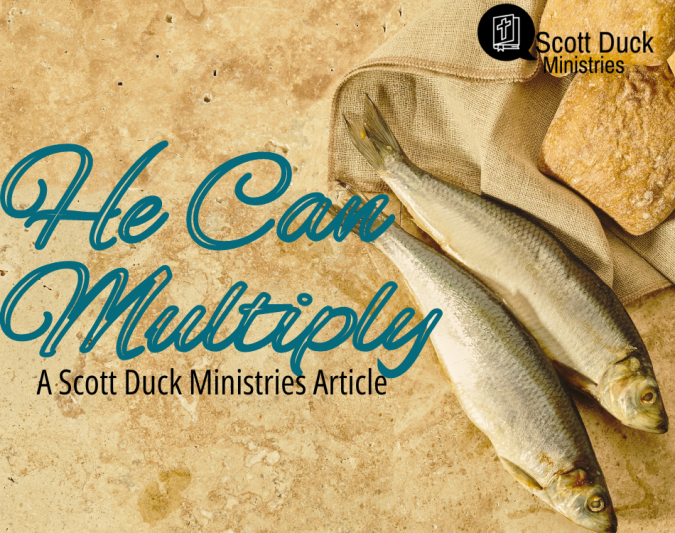
I have written a couple of times recently, concerning the sacrifice which is necessary if we are to truly live as disciples of Christ. I would like to continue this theme of sacrifice in this article. Before reading this article, you may want to read those first two.
Now, I would like to discuss the first feeding of the multitude by Jesus, which is the only miracle of Jesus, other than the resurrection, which is recorded in all four Gospels. Notice that I said the first. Many people simply mention “Jesus’ feeding of the multitude”, as though it only happened once but it actually happened at least twice, as there are two distinct accounts, of what are clearly two separate events, recorded in both Matthew’s and Mark’s Gospels. I am going to focus on Mark’s account here, and also draw a bit from John’s account.
Mark 6
30 Then the apostles gathered to Jesus and told Him all things, both what they had done and what they had taught.
31 And He said to them, “Come aside by yourselves to a deserted place and rest a while.” For there were many coming and going, and they did not even have time to eat.
32 So they departed to a deserted place in the boat by themselves.
33 But the multitudes saw them departing, and many knew Him and ran there on foot from all the cities. They arrived before them and came together to Him.
34 And Jesus, when He came out, saw a great multitude and was moved with compassion for them, because they were like sheep not having a shepherd. So He began to teach them many things.
35 When the day was now far spent, His disciples came to Him and said, “This is a deserted place, and already the hour is late.
36 Send them away, that they may go into the surrounding country and villages and buy themselves bread; for they have nothing to eat.”
37 But He answered and said to them, “You give them something to eat.” And they said to Him, “Shall we go and buy two hundred denarii worth of bread and give them something to eat?”
38 But He said to them, “How many loaves do you have? Go and see.” And when they found out they said, “Five, and two fish.”
39 Then He commanded them to make them all sit down in groups on the green grass.
40 So they sat down in ranks, in hundreds and in fifties.
41 And when He had taken the five loaves and the two fish, He looked up to heaven, blessed and broke the loaves, and gave them to His disciples to set before them; and the two fish He divided among them all.
42 So they all ate and were filled.
43 And they took up twelve baskets full of fragments and of the fish.
44 Now those who had eaten the loaves were about five thousand men.
In verses 30 through 32, we see that the disciples had been very busy and were reporting to Jesus about all they had done. Not long before, He had sent them out on their own to minister (verse 7) and they had just returned. They were no doubt very tired. Recognizing this, Jesus asked them to come away with Him, to a place by themselves, so that they could rest.
In our rat race society, we are very busy, often too busy, and We often get very tired. We want to just sit down and rest. Can you identify with the disciples here? I certainly can. To be clear, there most definitely is significant value in both physical and spiritual rest. We can only do so much and we must take time to be still before Him, to commune with Him, to know that He is God (Psalm 46:10). However, the ministry that He has called us all to, in some form, must remain paramount.
The disciples didn’t end up getting much rest. In verses 33 and 34, the multitudes saw them going away and followed them. It would have been very tempting to just ignore them or tell them to go away. After all, they were exhausted from having ministered to a great many people already. But Jesus did not do that. He had compassion for them, because “they were like sheep not having a shepherd”, and so he ministered to them.
This is reminiscent of our world today and the obligation we have as Christians. The world in which we live is, for the most part, lost. They have a Shepherd available but they will not go to Him. We are to follow Jesus’ example. Even when we are worn out from the demands of life, we are called to have compassion on them and minister to them, to lead them to the Good Shepherd.
At this point, it was Jesus doing the ministering. The disciples were probably very glad of that. They may have thought something like “Oh good, we can just let Him work a while, while we rest”, but it didn’t work out that way, at least not for long.
Jesus was teaching and teaching and it was getting late. The disciples were tired to begin with and, even with Jesus being the one now doing the work, even listening can become tiring after a while, as those who have heard me preach may attest. They seemingly said among themselves, “OK, time to end this” and they went to Jesus to see about doing that. In verses 35 and 36, they basically told Jesus that it was late and the people would be getting hungry so he needed to give the invitation and let the people go on their way, so that they (the people) could get something to eat. They probably really were thinking of the people but they were probably also thinking of themselves. The disciples had to be hungry too, because we had already been told that they hadn’t had anything to eat, even before they went away and were followed by the crowd. But the disciples plan backfired in verse 37, when Jesus said “you give them something to eat”.
It can be a bit like this for us today. We see the needs of the world and we recognize that something needs to be done but we are tired. We want those in need to somehow handle their needs themselves but Jesus has called us to help them. We, too, are supposed to be His disciples.
Continuing n verse 37, they said “What, have you lost your mind”. That isn’t really what they said but that’s basically what they meant. When they asked Him if He wanted them to go buy 200 denarii worth of bread, that was surely a rhetorical question. Two hundred denarii was several months worth of wages for the average worker and we see, in John’s account, that even this would have not been enough to buy enough bread to feed them all (John 6:7). The disciples were doing what we tend to do, thinking in terms of our limited human abilities. But, of course, Jesus had an answer.
He asked how much food they had available and the answer was five loaves of bread and two fish. We see in John’s account that this food was donated by a little boy (John 6:9). That little boy was willing to share his food but it wasn’t nearly enough to feed five thousand men, probably about twenty thousand people in total, including women and children. Do you ever feel like that little boy? You want to help, to serve, but the resources are just not sufficient to the task at hand? I certainly feel that way sometimes. That’s OK. Jesus can multiply.
In verse 41, Jesus blessed the food and distributed it to the disciples, so that they could distribute it to the people. Notice here that Jesus is not the only one who multiplied. He also gave the disciples the power to multiply. He did, himself, have to multiply. He had two fish and I doubt he gave each disciple only one sixth of a fish. However much He gave each of them, they in tern had to do more multiplication than He had done. Twelve men served probably about twenty thousand people. That means each disciple probably served between fifteen hundred and two thousand people. This had to take a long time. Even if they managed to work quickly and serve one person every ten seconds, it would have taken roughly three hours to serve them all. If the disciples thought they were tired before this, I’m sure they were completely exhausted afterword. God does make it possible to do what he calls us to do but He never said it would be easy. He said the opposite in fact. But you know what? I bet the disciples thought it was worth it.
Jesus did also take care of the disciples needs. After the people had eaten all they wanted, the disciples took up twelve baskets full of left over food (verse 43), enough for their own feast. It’s the same for His disciples today. We don’t always get a feast (don’t buy into the prosperity gospel) but He definitely does take care of His children.
What can we take from this, as we seek to live our own lives for Jesus? We are a relatively small group of saved people, living in a very big lost world. We may often feel the world pressing in on us, just as the disciples felt the press of the crowd. We may be tempted to want them to just go away, especially when we feel that their need is too great for us to handle, but, like Jesus, we must see them for what they are, lost sheep without a shepherd, and we must minister to them. This is where sacrifice comes in. Even when we are tired, we must be willing to expend our energy. Even when we are short on time, we must find time to minister and, since there are only 24 hours in a day and 168 hours in a week, we may have to re-prioritize, in order to shift some of those hours from worldly pursuits to Kingdom pursuits. When we feel that the needs of the world are just too big for us to handle, we need to rest in the knowledge that they are, in fact, way too big for us to handle and so we need not worry about our own weakness. We need to give them to Jesus. He doesn’t need our resources. He wants our willingness. We can then watch Him do his multiplication, to let Him work through us, in order to do things that our resources should not be able to accomplish, and in fact cannot accomplish. Through this, we can show the world that God is good and Jesus is Who He says He is, just as the crowd came to realize Who He was(John 6:14). We must realize that God makes this possible but He often does not make it easy and there is a reason for that. He grows us through the hardships and ministers to us, even as He ministers through us. It is He Who must get the glory but we will get something better than glory, true joy.
